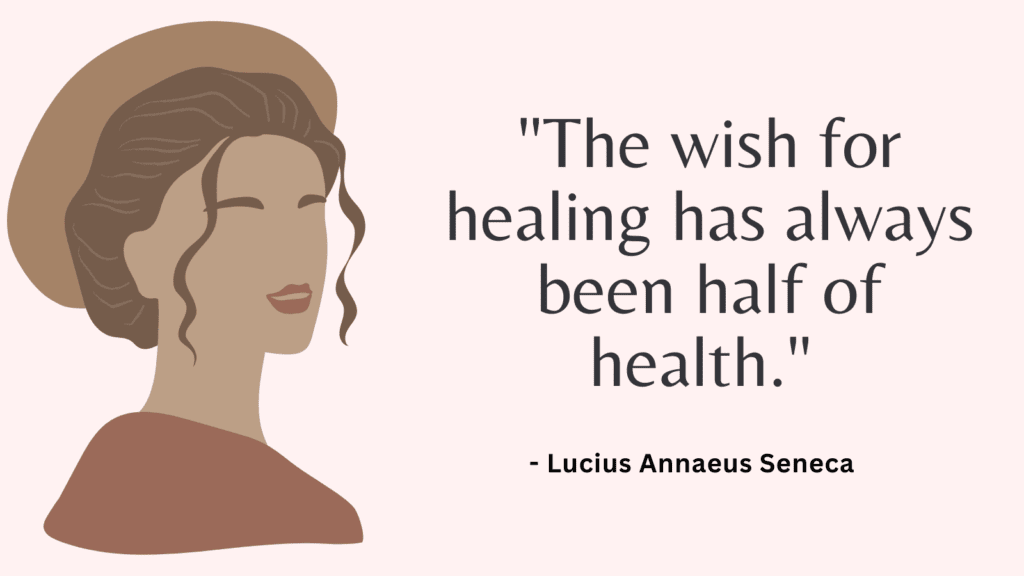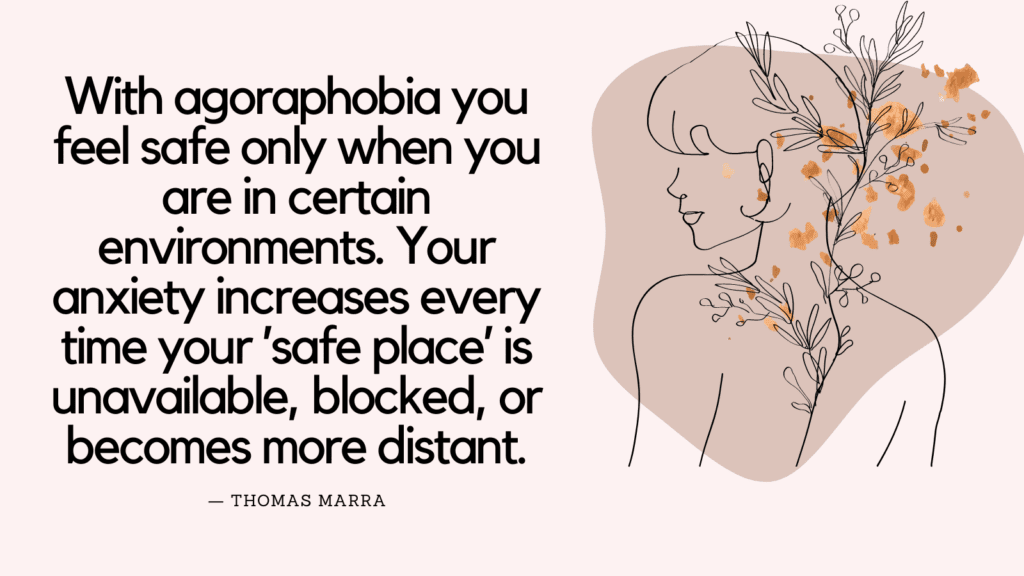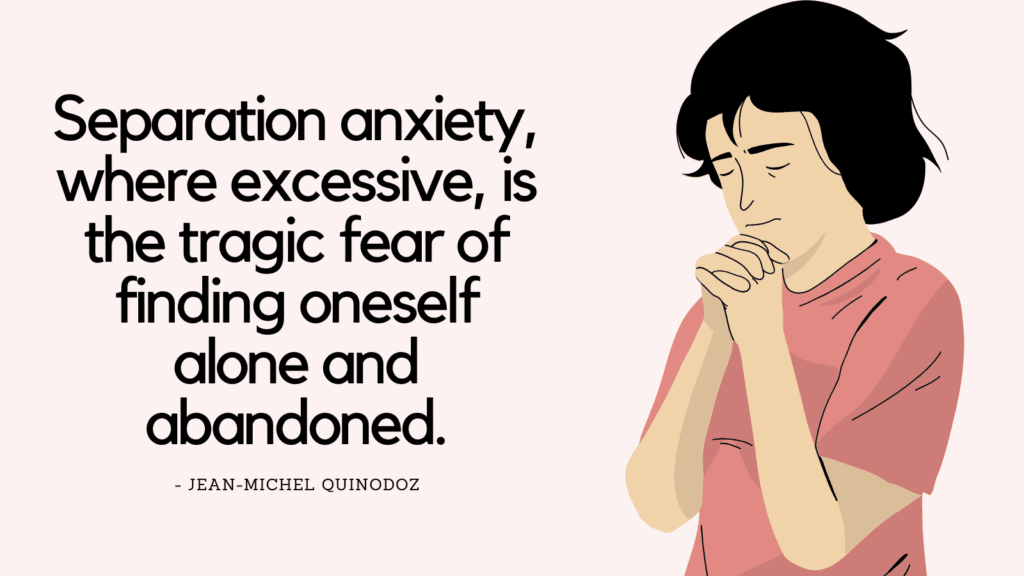This post contains some of the best postpartum anxiety quotes to help you feel less alone.
What Is Postpartum Anxiety?
Postpartum anxiety is a type of anxiety that occurs in individuals after giving birth.
It is characterized by excessive worry, fear, and feelings of unease or tension that persist beyond what is considered normal postpartum concerns.
These symptoms can significantly interfere with daily functioning and impact the person’s overall well-being.
Unlike the usual worries and concerns that many new parents experience, postpartum anxiety involves intensified and persistent fears related to the baby’s health, safety, and well-being.
It can also extend to concerns about the individual’s own health, relationship, or other aspects of life.
Individuals with postpartum anxiety may constantly feel on edge, have racing thoughts, and struggle to relax or sleep, even when the baby is resting.
Postpartum Anxiety Quotes
1. “Postpartum anxiety is comparable to generalized anxiety disorder, or GAD, which is marked by excessive worry. It is measured by the degree to which it interferes with a woman’s ability to function and get through the day and how much distress it causes her.” – Karen Kleiman
2. “Academic research and mainstream literature have expanded their focus on postpartum depression (PPD) to include issues related to postpartum anxiety and other disorders as well. The term distress is now used when anxiety and depression present concurrently, which is more prevalent than previously understood.” – Karen Kleiman
3. “All new mothers are somewhat anxious. Being a mother is a new role, a new job, with a new person in your life and new responsibilities. Anxiety in response to this situation is very common. Pediatricians, obstetricians, and nurses are used to worries, concerns, and questions like yours. However, for reasons we cannot explain, some mothers have excessive worries and experience a severe level of anxiety.” – Linda Sebastian, ARNP
4. “Anxiety during and after pregnancy can range from normal worry and anticipation to severe, incapacitating fear.” – Pamela S. Wiegartz & Kevin L. Gyoerkoe
5. “Anxiety during and after pregnancy is only beginning to get the attention that it deserves. There is much left to discover, but we are finally recognizing anxiety in new moms and moms-to-be and appreciating its impact on both mother and child.” – Pamela S. Wiegartz & Kevin L. Gyoerkoe
Related: Best 10 Nonfiction Books About Loneliness
6. “Anxiety symptoms are a common experience of both pregnant and postpartum women. If you had problems with anxiety before you became pregnant, these symptoms may worsen during pregnancy or after the birth. Even if you’ve never had trouble with anxiety before, as a pregnant or new mom you may be particularly vulnerable to certain kinds of anxiety.” – Pamela S. Wiegartz & Kevin L. Gyoerkoe
7. “As is the case with those experiencing other anxiety problems, people who worry often have behaviors that they perform in an attempt to decrease anxiety. These are called worry behaviors. Worry behaviors don’t actually have a real effect on the outcome; they just make the person feel better temporarily.” – Pamela S. Wiegartz & Kevin L. Gyoerkoe
8. “Because this is a rapidly evolving field of study, reported rates of anxiety problems during pregnancy and the postpartum phase vary greatly. We do know that many women struggle with fear and worry during this time. Researchers note anywhere from 5 to 16 percent of women have an anxiety disorder during pregnancy or the postpartum period.” – Pamela S. Wiegartz & Kevin L. Gyoerkoe
9. “CBT is an effective strategy for reducing anxiety during pregnancy and the postpartum period.” – Pamela S. Wiegartz & Kevin L. Gyoerkoe
10. “Depression is very treatable, especially when identified during pregnancy or early in the postpartum period before her symptoms become protracted. Early identification of mothers who are at risk for prenatal and postpartum depression and anxiety augments treatment, which can prevent problems for both the mother and baby.” – Karen Kleiman
11. “Every postpartum woman is preoccupied, whether she is depressed or not. This is not the best time to insert a therapeutic relationship and time – intensive healing process. But if her symptoms of depression and anxiety are acute enough, if she is sick enough, if her thoughts are distorted enough, she needs help.” – Karen Kleiman
12. “For some women, without warning, things take a turn for the worse. Symptoms of depression and anxiety descend, crowding her frantic schedule with a thickening fog distracting her from the task at hand. She cannot think straight. Now she wonders why she had this baby. She thinks this was all a mistake. She longs to return to her life before the baby came. She feels resentful, lost, hopeless, agitated, and forever guilty. To make matters worse, she is told by friends, family, and her doctor that this is normal. If she feels bad enough, long enough, she is told she should talk to a therapist so she can find relief from her overwhelming emotions.” – Karen Kleiman
13. “Given that about one-third of women will suffer from an anxiety disorder at some point in their life (Kessler et al. 1994), maybe we shouldn’t be surprised that anxiety is common among new moms and moms-to-be.” – Pamela S. Wiegartz & Kevin L. Gyoerkoe
Related: Best 10 Postpartum Books
14. “If women do not take it upon themselves to be clear about how bad they are feeling, and if healthcare providers do not take the responsibility of screening for prenatal and postpartum depression and anxiety seriously, all of our advocacy work and push for greater awareness will continue to fall upon deaf ears.” – Karen Kleiman
15. “If you are a new mom or mom-to-be, your existing anxiety symptoms may worsen or you may be more vulnerable to developing certain types of anxiety problems. These include panic attacks, obsessions, compulsions, worry, and post-traumatic stress symptoms.” – Pamela S. Wiegartz & Kevin L. Gyoerkoe
16. “In the public eye, postpartum depression and its risks have overshadowed anxiety during pregnancy and the postpartum phase, but we hope that this is beginning to change. Those who suffer from anxiety know just how devastating its effects can be.” – Pamela S. Wiegartz & Kevin L. Gyoerkoe
17. “Life experiences may further influence who develops anxiety and who does not. For instance, women who have had miscarriages in the past are at increased risk of experiencing persistent anxiety symptoms (Geller, Kerns, and Klier 2004); moms with high-risk pregnancies also tend to show high levels of anxiety during pregnancy (Brisch et al. 2005).” – Pamela S. Wiegartz & Kevin L. Gyoerkoe
18. “Maybe the most consistent finding in the research literature is that clinically significant anxiety during pregnancy puts you at risk for postpartum depression.” – Pamela S. Wiegartz & Kevin L. Gyoerkoe
19. “One of the biggest factors to predict anxiety in new and pregnant moms is a history of anxiety (Breitkopf et al. 2006). Simply put, if you have had anxiety problems in the past, you may be vulnerable to relapse during pregnancy or the postpartum period. Other characteristics, like perfectionism, are also strongly related to anxiety during this time (Vliegen et al. 2006).” – Pamela S. Wiegartz & Kevin L. Gyoerkoe
20. “One of the most efficient and effective ways to counterbalance distress in this setting, especially distress that is anchored in misinformation, is to provide good, reliable information on postpartum depression and anxiety. Extremely anxious women are relying on social media or online resources for guidance. More and more they find strength from sources that are visited by like-minded women who seek companionship and support.” – Karen Kleiman
Related: Postpartum Depression Resources (Information, Podcasts, Books)
21. “People with anxiety disorders often report that others minimize, or brush off, their problems. Tiis may occur because all people experience anxiety. Most people do not understand the difference between anxiety disorders and normal anxiety.” – Linda Sebastian, ARNP
22. “Postpartum panic disorder is another anxiety disorder that manifests as distinct periods of intense fear and typically involves physical symptoms such as palpitations, sweating, claustrophobia, chest pain, shortness of breath, dizziness, lightheadedness, numbness, and a fear of dying and losing control (Beck, 2006). Most of the time, panic involves a catastrophic misinterpretation of bodily sensations. Women state that symptoms of panic wake them up and frequently report no identifiable trigger.” – Karen Kleiman
23. “Postpartum women do not want to go to therapy. Every muscle hurts, and somewhat unexpectedly, full-body fatigue replaces the long-anticipated joy. Women who have recently given birth are tired, distracted, and weary from the overwhelming worry. When depression or anxiety is part of this picture, life with a new baby can feel, and be, unimaginably difficult.” – Karen Kleiman
24. “Recently, there has been an increase in attention placed on depression and anxiety disorders that affect fathers after the birth of a baby. Although this phenomenon is not new, of late it has received long-overdue consideration from the medical community.” – Karen Kleiman
25. “Regardless of the preexisting psychodynamic issues or long – standing risk factors, experts agree that the states of pregnancy and the postpartum period make some women more vulnerable than others to experiencing significant distress. In fact, postpartum depression and anxiety are the most common complications of childbirth.” – Karen Kleiman
26. “Therapists who specialize in the treatment of perinatal depression and anxiety are both challenged and honored to accompany a postpartum woman as she teeters on this precipice between her struggle to get through the day and her intermittent wish to give up.” – Karen Kleiman
Related: Postpartum Anxiety Quiz (+ 5 Tips On Overcoming PPA)
27. “This entire subject of treating women with postpartum depression and anxiety would be easier if psychotherapy were a precise and predictable science, with standards of exact care applicable to each and every therapist. In reality, every time a postpartum woman walks into a therapist’s office for the first time, neither she nor the therapist knows what to expect.” – Karen Kleiman
28. “Unfortunately, the bottom line is that we simply don’t yet know why some women develop anxiety symptoms in response to pregnancy while others do not.” – Pamela S. Wiegartz & Kevin L. Gyoerkoe
29. “Women with postpartum anxiety disorders experience a spectrum of problems that range in severity from adjustment disorder to generalized anxiety disorder (GAD) to obsessive-compulsive disorder to panic disorder.” – Linda Sebastian, ARNP
30. “Women with postpartum anxiety report feeling tense and irritable, nervous in social situations, feelings of pending doom, and preoccupied with uncontrollable worries related to the physical well-being of self and other, particularly the baby. Frequently, there is an increase in attention to physical symptoms such as nausea, shakiness, blurry vision, insomnia, fatigue, restlessness, racing heart, and shortness of breath.” – Karen Kleiman
31. “Women with postpartum depression and anxiety are perpetually frustrated. Although they may express an overwhelming sense of responsibility toward their baby, as well as a desire for all to be good again, they are periodically or incessantly pissed off and irritated. It’s not fair, we often hear. Because of this, feelings of aggression and unbridled anger may ensue.” – Karen Kleiman




